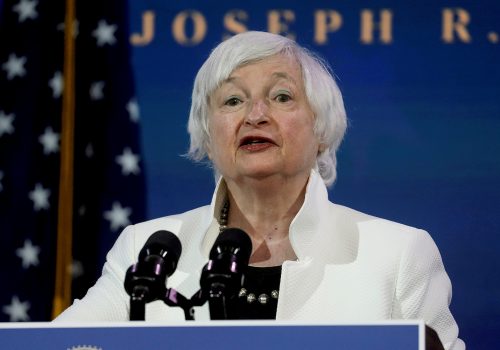Delayed but not defeated: The road ahead for a global minimum corporate tax
Last year, over 130 countries agreed to a global minimum corporate tax rate of fifteen percent. The historic agreement could alter international corporate taxation for the better by helping countries prevent corporate tax avoidance and evasion. However, since then, countries have faced significant difficulties enacting the tax. Policy complexity and political pressure have led to missed deadlines and uncertainty around how to implement the tax. One of the agreement’s leading proponents, the United States, seems unlikely to institute the tax in the near-term. Still, although the implementation process has been rocky and delayed, the incentives and motivation to move forward do exist, and the global minimum corporate tax is likely to advance.
Reforming the international corporate tax system was always going to be a complicated process despite the clear need to prevent a race to the bottom on corporate tax rates; policy and political inertia has kept the current apparatus in place for nearly a century. After decades of the status quo, governments and businesses are analyzing final tax design and administration details. For example, which tax credits and deductions should be exempted under the new tax, and how would these decisions impact domestic tax codes?
Aside from policy questions, there has also been substantial political pressure against a global minimum corporate tax. Some businesses have lobbied against the tax, and countries have been hesitant to implement the tax first out of fear that if other nations don’t quickly follow, their businesses will be disadvantaged. In the United States a global minimum corporate tax was not included in the Inflation Reduction Act (IRA) for this reason. The IRA did enact a fifteen percent minimum corporate tax on accounting book income; however, this tax is different in several ways and does not adhere to the global agreement. Notably, the IRA minimum tax does not calculate taxable income on a country-by-country basis.
The European Union (EU), another leader in forming the agreement, has also struggled to move forward with implementation. Procedural rules make it difficult to enact the tax on an EU-wide level without unanimous support from the bloc’s twenty-seven members. Twenty six members have currently signed off, but Hungry is opposing it.
Considering these challenges, the OECD announced that the formal rules will not be completed until 2023. Implementation will not occur until late 2023 or 2024. The rules were supposed to be finished by mid-2022. Concerns are mounting that countries are going to lose interest, no country will go first, and a moment of promise to reform the international corporate tax system will prove fleeting.
However, while the path forward does not look easy, this is unlikely to be the end of a global minimum corporate tax. The Organization for Economic Cooperation and Development (OECD) led negotiations have made progress on final implementation rules for central components of the agreement, such as the “undertaxed profits rule.” If a multinational corporation (MNC) profitably operates in a country without a minimum corporate tax rate of fifteen percent, the rule allows participating countries to “top up” the company’s tax rate. This enforcement mechanism creates strong financial incentives for non-participating countries with MNCs to join the agreement and collect new corporate tax revenue.
For example, assume Country A has a corporate tax rate of twenty five percent, Country B has a rate of ten percent, and Country C has a rate of nine percent. The global minimum tax rate is fifteen percent. Company X operates in Country A, reports income in Country B, and is headquartered in Country C. Country A would “top-up” the taxes paid on Company X’s reported profits in Country B by five percent (the global minimum of 15 percent minus Country B’s rate of 10 percent) and collect additional tax revenue. The agreement enables Country A as a participating country to do this because Company X’s home country, Country C, is not participating in the agreement and does not top up the tax rate on Company X’s income in Country B.
The key to this rule is that a critical mass of countries where MNCs operate must implement the agreement. Once a major economy imposes the tax and starts collecting additional revenues, other countries are more likely to follow suit. MNCs in non-participating countries would be paying more taxes either way, and countries will want to keep the revenue their MNCs are sending elsewhere. When the first domino falls, a chain reaction ensues.
The EU could act as that first domino. While the EU has not yet implemented the tax, twenty six of its twenty seven members want to and they represent most of the bloc’s economy (the third largest in the world). If Hungry does not agree, members may individually change their tax codes via domestic legislation or adjust procedural rules such that unanimous support is not required for EU-wide implementation. Ratification by the EU would be an enormous step forward and alleviate concerns about who goes first. Other allies, such as Canada and Japan, are also in the process of actively trying to move the tax forward
At times it seemed like the United States was going to be the leader in forming this agreement and implementing it. That is no longer the case, but the United States could still join at a later point. If other OECD economies and allies implement the tax, the United States would be motivated to do so because it would lose out on billions of dollars in corporate tax revenue a year and create complexity for its MNCs by having multiple international tax regimes for them to comply with. Additionally, after the IRA, the United States will now have even more experience with a minimum corporate tax. The administrative infrastructure would merely need to be adjusted, not transformed.
It was a pleasant surprise when the global minimum corporate tax agreement happened last year given the difficulty of major tax reform. Implementation has not been smooth thus far, but there is enough alignment between financial incentives and diplomatic will that another pleasant surprise is likely in store.
Jeff Goldstein is a contributor to the Atlantic Council’s GeoEconomics Center. During the Obama administration he served as the Deputy Chief of Staff and Special Assistant to the Chairman of the White House Council of Economic Advisers. He also worked at the Peterson Institute for International Economics. Views and opinions expressed are strictly his own.
Further reading
Image: Corporate Tax, Calculator, Finance, Chart, Graph

